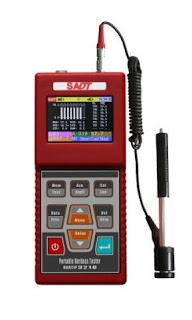Advantages of Portable Hardness Testers

Hardness testers are devices that are used primarily for testing the hardness of workpieces by applying rapid shock loading. These instruments are designed to measure the force required to penetrate a material, either with a calibrated steel probe or a diamond tip. Hardness testers are used to determine the hardness of steel, aluminum, brass, and other materials. Hardness testers have taken on a variety of forms over the decades since their invention. Most manufacturers now produce a wide variety of models to suit various applications and needs of users. In general, hardness testers are classified as either impact testers or penetration testers. Impact testers use an impact hammer to generate shock loads while penetration testers must penetrate a workpiece in order for the resulting force to be measured. Both types serve identical functions and have the same basic design components. Portable Rockwell hardness tester: Portable Rockwell hardness tester is the commonly used hardness t


